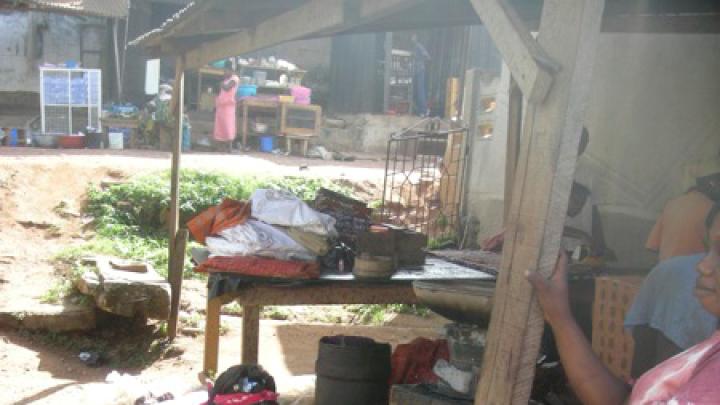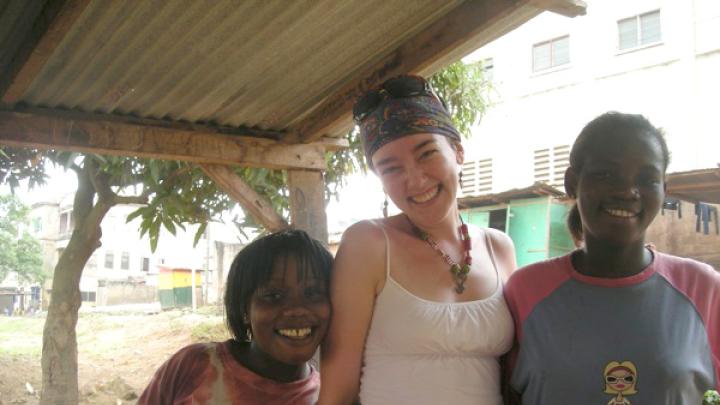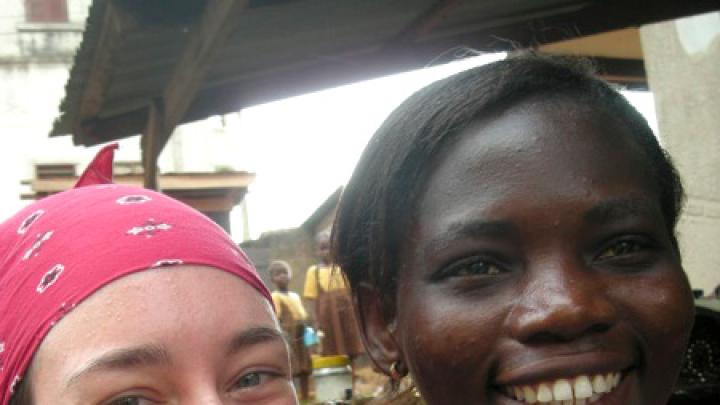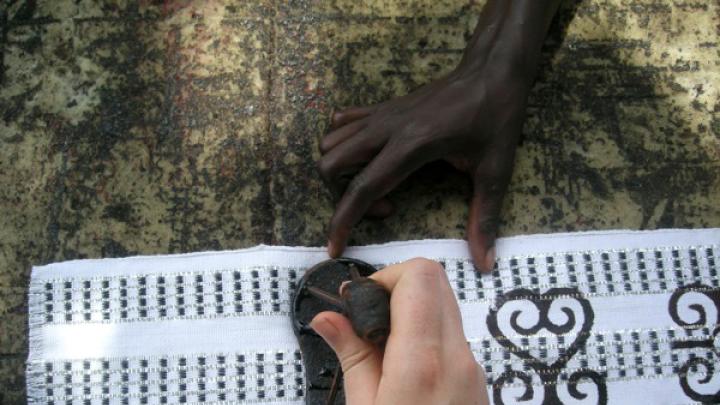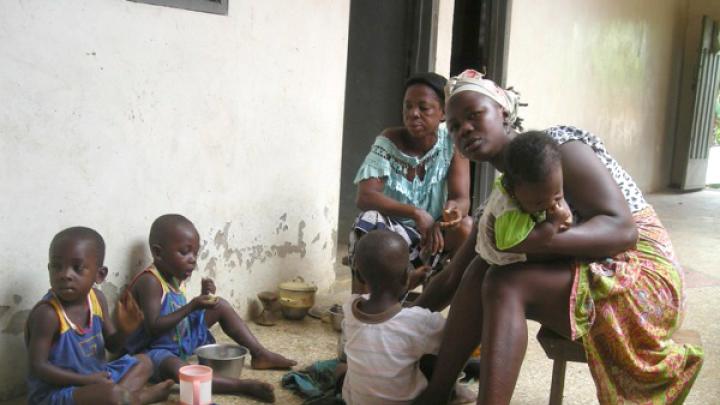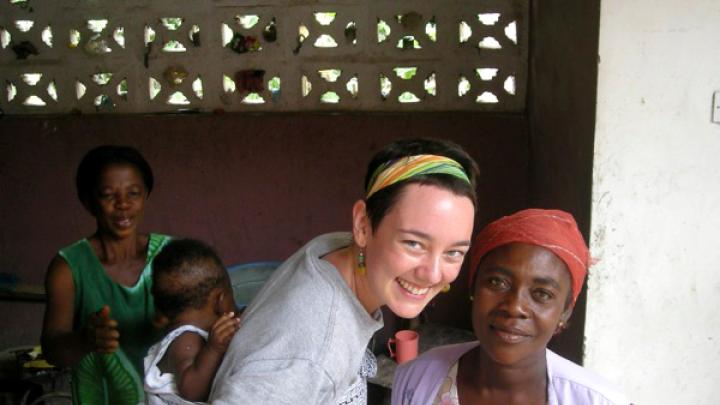In Ghana, a country with a population of 24 million, the number of psychiatrists can be counted on one hand. This situation, typical for African countries, speaks to the state of—and the pressing need for—mental-health care there.
For Grace Ryan ’10, this need overlaps with a personal interest: an unusually high number of illnesses and disabilities, both physical and mental, exist in her own family. As a child, she noticed that each person’s medical problems “shaped their life in some way. That, as a result, shapes the future of the entire family and how we relate to each other.” Ryan set her sights on a career in medical anthropology even before coming to Harvard. She dreamed of studying with Arthur Kleinman, Rabb professor of anthropology, professor of medical anthropology, and professor of psychiatry. Now he is her thesis adviser.
Ryan spent last summer in Ghana’s capital, Accra, interning with a local nongovernmental organization (NGO) that was producing a film to document conditions in psychiatric hospitals and other facilities that provide care for the mentally ill. The film was intended to advocate for the passage of national mental-health legislation that would be the first bill passed on the subject since 1972. (Prior to that, laws on the topic hadn't been amended since 1888.)
Her interest in the country had taken shape a year earlier. Working in a tattoo parlor in her hometown of Livermore, California, she noticed people asking for tattoos featuring Adinkra, symbols traditionally stamped onto funeral cloths in the Ashanti region of Ghana. “I got really interested in why northern-California kids were getting these West African tattoos that were supposed to embody African wisdom,” says Ryan, who is concentrating in social anthropology, with visual and environmental studies as a secondary field. Capitalizing on a general desire to visit Africa, she found a study-abroad program that would allow her to conduct an independent-study project alongside Ghanaian textile artists, and enrolled for her junior-year fall.
Afterward, back at Harvard, she immediately started trying to figure out how to return to Ghana, enrolling in a slew of related classes, including a Twi language course. She found that the experience of going abroad “gives a sense of grounding and place” to her education—even when she’s learning about places she hasn’t yet been. For example, she says, her experience in Ghana lends perspective to her current junior tutorial (delayed a year due to her study abroad) on community and citizenship in South Asia. In studying India, Ryan finds it useful to draw comparisons with Ghana (another former British colony) “and look at the different trajectories their histories took, at why India is now such a different place from Ghana and why we think about them so differently.” Her original plan for the summer of 2009 (with funding from a Harvard Initiative for Global Health grant program) was to film mentally ill people’s own narratives, and she still believes those stories need to be told. But she changed course after arriving in Accra and learning that debate on the mental-health bill was at a critical juncture (it faced filibuster).
Ryan warns against being too quick to pity Ghanaians for not having the mental-health care infrastructure that exists in the United States. There are bona fide problems: most patients who need psychotropic medications lack access, and there aren’t close to enough beds in psychiatric hospitals to meet the demand. But the country has a rich resource in its traditional and spiritual healers—who offer treatments that do work for some patients, Ryan notes. Among other provisions, the mental-health bill—praised by the World Health Organization as model legislation—would expand the legal definition of mental-health professionals to include religious and traditional healers, recognizing the value of these services and giving the government the ability to regulate them. And, Ryan notes, one of the detrimental attitudes about mental illness in the United States—that people can and should simply pull themselves out of it through self-discipline—is virtually nonexistent in Ghana because of the prevailing notion that people in a community have a responsibility to care for each other. “Your life isn’t just yours,” she says. “It’s not hyperindividualistic like we are here.”
During the summer, Ryan also shot footage for her own documentary, which will focus on the political factors that affect mental-health care, including policy decisions and the allocation of resources, and how NGOs navigate the political sphere and influence these factors. Taking part in filming the NGO's documentary inspired in her a keener awareness of the importance of how stories are told, and the potential pitfalls inherent in appropriating personal stories for advocacy purposes. The desire to foster support for the reform bill provided an incentive to make conditions in mental-health care facilities look as inhumane as possible. Indeed, Ryan did encounter crippling problems, from sanitation issues to food shortages, in the facilities she visited—yet she found herself sympathizing with the mental-health professionals she met and hesitating to cast them as human-rights violators. In most cases, she believes workers there are making the best of extremely meager resources.
This second film, which follows the process of making the NGO film, will be her final project for a course on ethnographic filmmaking, as well as an “addendum” to her senior thesis, tentatively titled “Struck Mad: Structural Violence and Mental Health in Accra, Ghana.” Structural violence, a favorite term of Presley professor of global health and social medicine Paul Farmer, refers to indirect ways that governments and other institutions harm people. In the case of Ryan’s project, the Ghanaian government’s failure to provide adequate mental-health care to its citizens—and to the poor in particular—can be seen as depriving people of mental health and, in some cases, of their very lives. She hopes that by the time her thesis is finished, the Ghanaian mental-health bill (still under consideration at this writing) will have become law.

